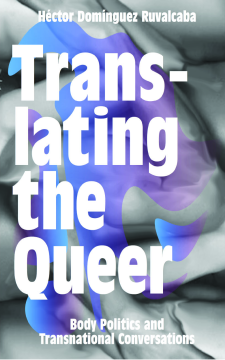
Additional Information
Book Details
Abstract
What does it mean to queer a concept? If queerness is a notion that implies a destabilization of the normativity of the body, then all cultural systems contain zones of discomfort relevant to queer studies. What then might we make of such zones when the use of the term queer itself has transcended the fields of sex and gender, becoming a metaphor for addressing such cultural phenomena as hybridization, resignification, and subversion? Further still, what should we make of it when so many people are reluctant to use the term queer, because they view it as theoretical colonialism, or a concept that loses its specificity when applied to a culture that signifies and uses the body differently?
Translating the Queer focuses on the dissemination of queer knowledge, concepts, and representations throughout Latin America, a migration that has been accompanied by concomitant processes of translation, adaptation, and epistemological resistance.
Héctor Domínguez Ruvalcaba is a professor in the Department of Spanish and Portuguese at the University of Texas, Austin, where he teaches queer and gender issues in Latin American literature, film, and culture.
‘Ruvalcaba offers a concrete vision of queer resistance, one that it is not just a movement for gender liberation but also a transnational quest to decolonize the present. A must read for anyone grappling with queer politics in the Americas.’
Holly Lewis, author of The Politics of Everybody
‘A profound work that will illuminate both how, through the figure of the queer, Latin Americanists should consider central concepts such as the nation, citizenship, and identity; and how queer theorists outside Latin America might envision a more thorough understanding of histories of the queer.’
Ben. Sifuentes-Jáuregui, author of The Avowal of Difference: Queer Latino American Narratives
'Ruvalcaba’s significant contribution to queer studies is a survey of the field’s more contemporary scholarship produced in Latin America and abroad … very useful for scholars looking to expand the exchanges between translation and queer theories.'
Translation Studies
'There is much to be learned from Translating the Queer about socio-sexual processes in Latin America and the always-frayed fabric of the heterosexist project.'
David William Foster, Anthropological Forum
Table of Contents
| Section Title | Page | Action | Price |
|---|---|---|---|
| Front cover | Front cover | ||
| About the author | iii | ||
| Title page | v | ||
| Copyright | vi | ||
| Contents | vii | ||
| Acknowledgments | ix | ||
| Introduction. Troubles and travels ofthe queer | 1 | ||
| Latin American queer studies have been undertaken in a transnational dialogue, which implies a politics of cultural translation | 3 | ||
| Colonialism/decolonization is a tension implicit in the articulation of queer dissidences | 8 | ||
| Queerness has been associated with modernity in most twentieth-century debates on gender and sexuality | 11 | ||
| Queer is a methodology of critical thinking that by deconstructing the gender system questions the foundations of the nation and the state | 14 | ||
| The machineries of consumption and disposability of neoliberalism complicate the processes of body liberation and queer expressions | 17 | ||
| Chapter 1. Queer decolonization | 19 | ||
| Coloniality and queerness: A discursive invasion | 20 | ||
| Queer colonial and translation | 23 | ||
| Reading the visceral | 30 | ||
| Centrality of the liminal | 39 | ||
| Conclusion | 52 | ||
| Chapter 2. Queerness and the nationin peripheral modernity | 55 | ||
| The modern politics of the body | 58 | ||
| The aesthetic weapon of queerness | 66 | ||
| Knowing the queer | 77 | ||
| To cover and to uncover: From closet to scandal | 82 | ||
| Queer resistance | 87 | ||
| Conclusion | 90 | ||
| Chapter 3. LGBT politics and culture | 93 | ||
| The libertarian age | 95 | ||
| Gay culture in Latin America | 104 | ||
| Coming out: Recurring asymmetries | 110 | ||
| Homophobia: The capital cause | 118 | ||
| The AIDS pandemic | 123 | ||
| Normalizing the queer | 128 | ||
| Chapter 4. Beyond LGBT struggles: Trans politics and neoliberal sex | 133 | ||
| Trans talk | 134 | ||
| Queerness and the neoliberal order | 154 | ||
| Conclusion | 165 | ||
| Conclusion | 167 | ||
| References | 171 | ||
| Index | 185 | ||
| Back cover | Back cover |
